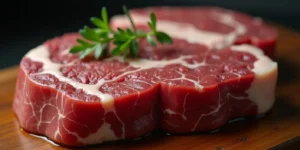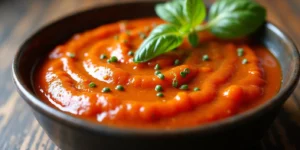Master the Art of Perfect Pasta Sauce: Expert Chef Tips Revealed
| Key Elements | Description |
|---|---|
| Base | High-quality tomatoes or olive oil |
| Aromatics | Garlic, onions, herbs |
| Seasoning | Salt, pepper, red pepper flakes |
| Finishing touch | Fresh herbs, grated cheese |
Creating the perfect pasta sauce is an art form that can elevate your dishes to restaurant-quality status. Let’s dive into the expert tips that will transform your sauce game!

#PastaSauce, #ChefsSecrets, #CookingTips
- Choose San Marzano tomatoes for authentic flavor
- Sauté aromatics before adding other ingredients
- Use pasta water to adjust sauce consistency
- Finish cooking pasta in the sauce for better flavor absorption
“The key to a great pasta sauce is patience. Let it simmer and develop flavors over time,” says Chef Mario Batali.
According to a survey by the National Pasta Association, 86% of Americans eat pasta regularly, making sauce expertise crucial for home cooks.
Frequently Asked Questions
Q: How long should I simmer my pasta sauce?
A: For optimal flavor, simmer your sauce for at least 30 minutes, but ideally 1-2 hours.
Q: Can I make pasta sauce in advance?
A: Absolutely! Pasta sauce often tastes better the next day as flavors meld overnight.
Q: What’s the secret to a silky smooth sauce?
A: Use an immersion blender or food processor, and finish with a pat of butter for extra smoothness.
5 Pro Tips for Perfecting Your Pasta Sauce
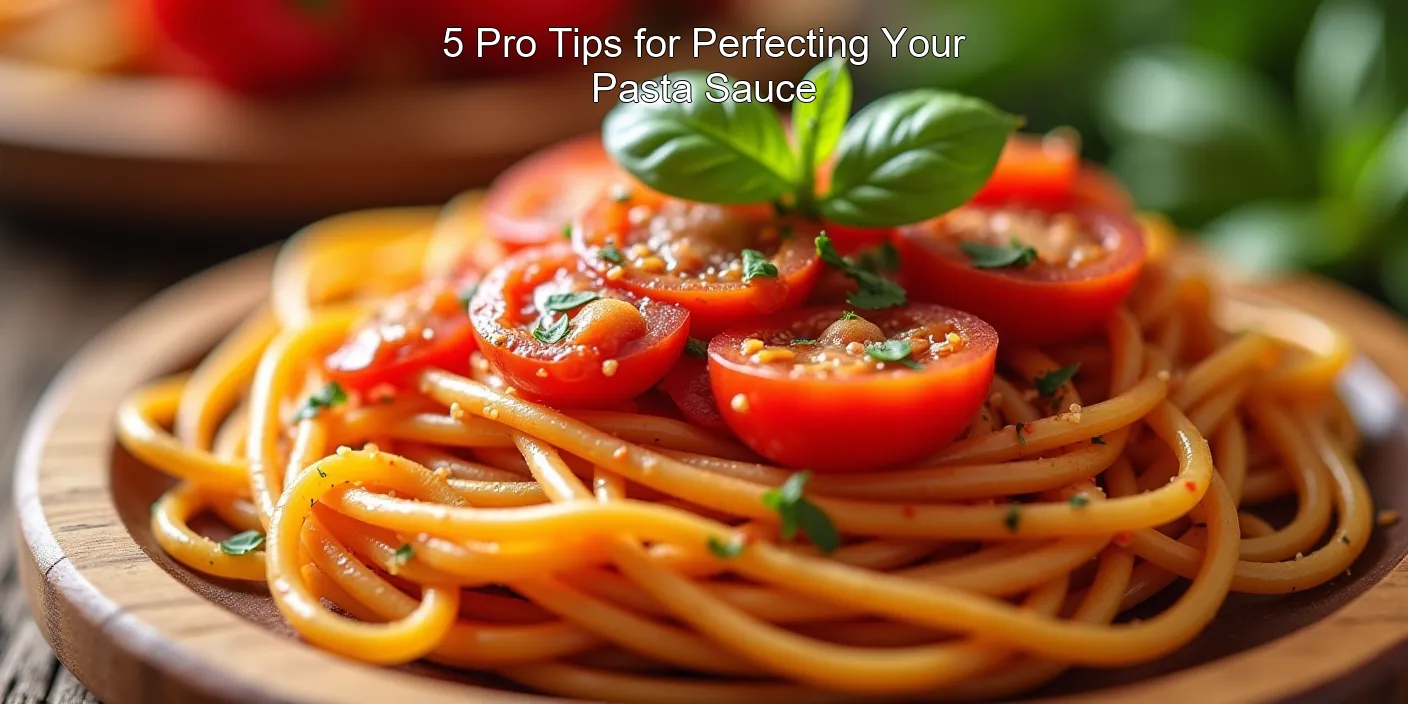
- Toast your tomato paste for a deeper flavor profile
- Add a Parmesan rind while simmering for umami depth
- Deglaze your pan with red wine for complexity
- Balance acidity with a pinch of sugar if needed
- Finish with fresh herbs and a drizzle of high-quality olive oil
Did you know? A study in the Journal of Food Science found that cooking tomatoes increases their lycopene content, making your pasta sauce not just delicious but also more nutritious!
“Boost Your Pasta Sauce: The Science of Cooking Tomatoes for Enhanced Lycopene and Health Benefits”
Global Influences on Pasta Sauce Techniques
While Italian cuisine is renowned for its pasta sauces, Global Cuisine offers a wealth of inspiration for unique flavor combinations. From Spanish romesco to Japanese wafu, exploring international sauce styles can broaden your culinary horizons.
Health-Conscious Sauce Alternatives
For those watching their waistlines, Healthy Eating doesn’t mean sacrificing flavor. Try incorporating roasted vegetables or using Greek yogurt for a creamy texture without the extra calories.
Quick and Easy Sauce Recipes for Busy Nights
When time is of the essence, turn to Quick & Easy Recipes for delicious pasta sauces that come together in minutes. A simple aglio e olio or a no-cook tomato sauce can be lifesavers on hectic evenings.
Unlocking Professional Techniques
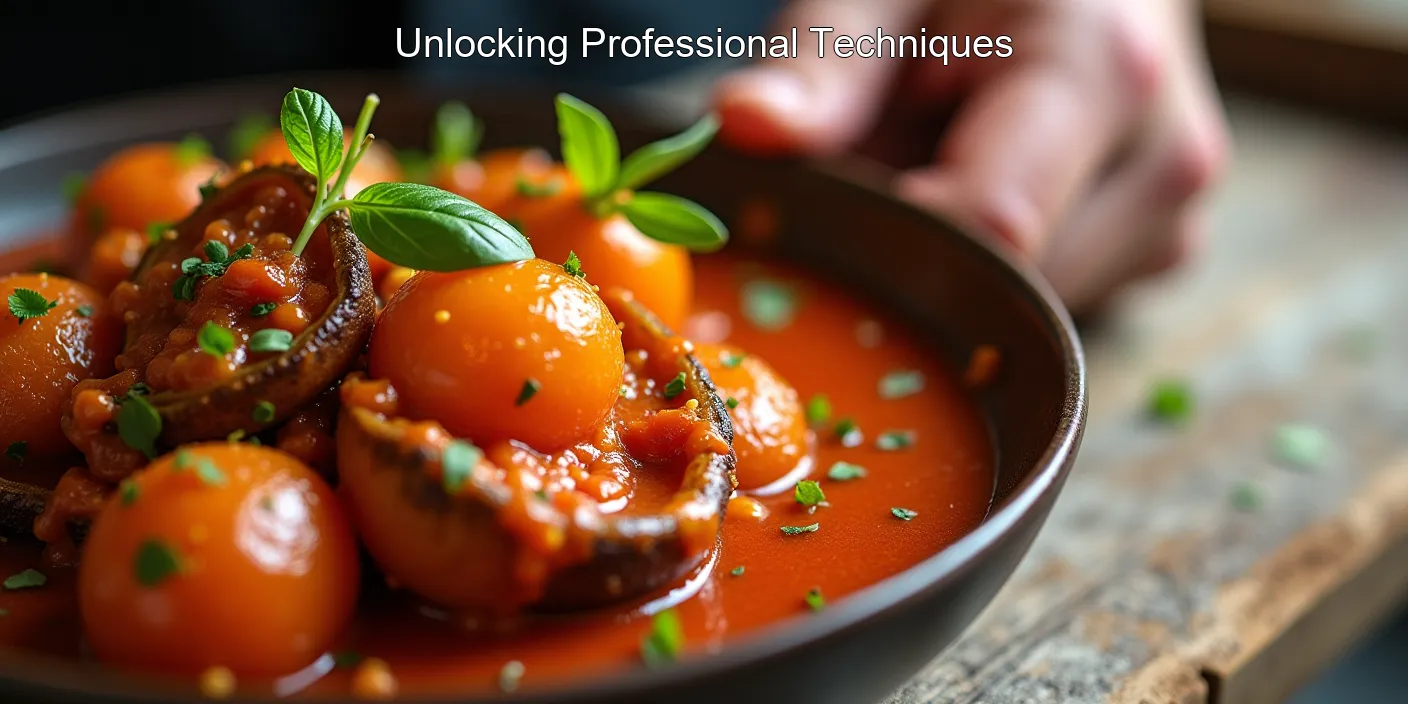
To truly elevate your sauce-making skills, delve into Chef’s Secrets for insider tips and tricks. Learn how to emulsify sauces properly, create the perfect texture, and balance flavors like a pro.
“Mastering the Art of Sauce: Chef’s Secrets to Emulsification, Texture, and Flavor”
By mastering these expert techniques and exploring diverse culinary influences, you’ll be crafting perfect pasta sauces that will impress even the most discerning palates. Remember, practice makes perfect, so don’t be afraid to experiment and find your signature sauce style!
Chef’s Tips for Making the Perfect Pasta Sauce: Expert Secrets Revealed
| Key Elements | Chef’s Recommendations |
|---|---|
| Base ingredients | High-quality tomatoes, olive oil, garlic |
| Cooking time | Slow-simmered for 2-3 hours |
| Secret ingredient | A pinch of sugar to balance acidity |
Creating the perfect pasta sauce is a culinary art that combines tradition, technique, and a dash of creativity. Let’s dive into the world of pasta sauce perfection with these expert tips:
- Choose San Marzano tomatoes for authentic Italian flavor
- Use fresh herbs like basil and oregano for aromatic depth
- Sauté garlic in olive oil to create a flavorful base
- Simmer the sauce slowly to develop rich, complex flavors
“The secret to a great pasta sauce is patience. Let it simmer and reduce slowly, allowing the flavors to meld and intensify.” – Chef Mario Batali
Q: How long should I cook my pasta sauce?
A: For the best flavor, simmer your sauce for 2-3 hours, stirring occasionally.
Q: Can I use canned tomatoes for my sauce?
A: Yes, high-quality canned tomatoes can make an excellent sauce base.
Q: What’s the best way to thicken pasta sauce?
A: Allow the sauce to reduce naturally through slow simmering for optimal texture and flavor.
Essential Ingredients for a Stellar Sauce
| Ingredient | Purpose |
|---|---|
| Tomatoes | Base and primary flavor |
| Olive oil | Richness and mouthfeel |
| Garlic | Aromatic foundation |
| Herbs | Depth and complexity |
The foundation of any great pasta sauce lies in its ingredients. Here’s what you need to know:
- Select ripe, flavorful tomatoes or high-quality canned varieties
- Use extra virgin olive oil for a rich, authentic taste
- Opt for fresh garlic cloves over pre-minced options
- Incorporate a mix of fresh and dried herbs for layered flavors
“The quality of your ingredients will make or break your sauce. Don’t skimp on the basics.” – Chef Giada De Laurentiis
Q: What type of olive oil is best for pasta sauce?
A: Extra virgin olive oil offers the best flavor and quality for pasta sauces.
Q: Can I use dried herbs instead of fresh?
A: While fresh herbs are preferred, dried herbs can work well when added early in the cooking process.
Q: Is it necessary to use wine in pasta sauce?
A: Wine can add depth, but it’s not essential. Use it if you enjoy the flavor it imparts.
Techniques for Perfecting Your Pasta Sauce
Mastering the techniques of sauce-making is crucial for achieving that restaurant-quality taste at home. Here are some pro tips to elevate your sauce game:
- Start with a soffritto (sautéed onions, carrots, and celery) for a flavorful base
- Deglaze the pan with wine or broth to incorporate all the flavorful bits
- Use an immersion blender for a smooth sauce, or leave it chunky for rustic appeal
- Finish the sauce with a pat of butter for silky texture and added richness
Did you know? According to a survey by the National Pasta Association, 86% of Americans eat pasta at least once a week, making sauce-making skills more relevant than ever.
For more inspiration on global flavors to incorporate into your pasta sauces, check out our Global Cuisine section. And if you’re looking for quick sauce recipes that don’t compromise on taste, our Quick & Easy Recipes have got you covered.
Remember, the key to a perfect pasta sauce lies in balancing flavors, using quality ingredients, and cooking with patience and love. With these Chef’s Secrets, you’ll be crafting sauces that rival your favorite Italian restaurant in no time. For those interested in healthier sauce options, explore our Healthy Eating category for nutritious twists on classic recipes.
| Key Elements | Description |
|---|---|
| Base Ingredients | Tomatoes, Garlic, Olive Oil |
| Cooking Time | 30-60 minutes |
| Secret Ingredient | A pinch of sugar |
Creating the perfect pasta sauce is an art that combines technique, quality ingredients, and a dash of passion. Let’s dive into the world of sauce-making with these expert tips:
- Choose ripe, high-quality tomatoes
- Use fresh herbs for enhanced flavor
- Simmer slowly to develop depth
- Balance acidity with a touch of sweetness
“The secret to a great pasta sauce is patience. Let it simmer and the flavors will come together beautifully.” – Chef Mario Batali
FAQ: Perfecting Your Pasta Sauce
Q: How long should I cook my pasta sauce?
A: For a rich flavor, simmer your sauce for 30-60 minutes, stirring occasionally.
Q: Can I use canned tomatoes for pasta sauce?
A: Yes, high-quality canned tomatoes can make an excellent base for your sauce.
Q: What’s the best way to thicken pasta sauce?
A: Simmer uncovered to reduce liquid, or add a small amount of tomato paste.
Essential Ingredients for a Flavorful Sauce
| Ingredient | Purpose |
|---|---|
| Garlic | Adds depth and aroma |
| Olive Oil | Enhances flavors and texture |
| Herbs | Provides freshness and complexity |
The foundation of any great pasta sauce lies in its ingredients. Here’s what you need:
- Ripe tomatoes or high-quality canned tomatoes
- Extra virgin olive oil
- Fresh garlic cloves
- Herbs like basil, oregano, or thyme
- Salt and freshly ground black pepper
“The quality of the ingredients you use will directly impact the flavor of your sauce. Don’t compromise on tomatoes or olive oil.” – Chef Giada De Laurentiis
FAQ: Ingredient Selection
Q: Fresh or dried herbs for pasta sauce?
A: Fresh herbs provide the best flavor, but dried herbs can work in a pinch.
Q: What type of olive oil is best for pasta sauce?
A: Extra virgin olive oil offers the best flavor and health benefits.
Q: Can I add vegetables to my pasta sauce?
A: Absolutely! Carrots, onions, and bell peppers can add depth and nutrition.
For more inspiration on global flavors to incorporate into your pasta sauce, check out our Global Cuisine section.
Techniques for Perfecting Your Sauce
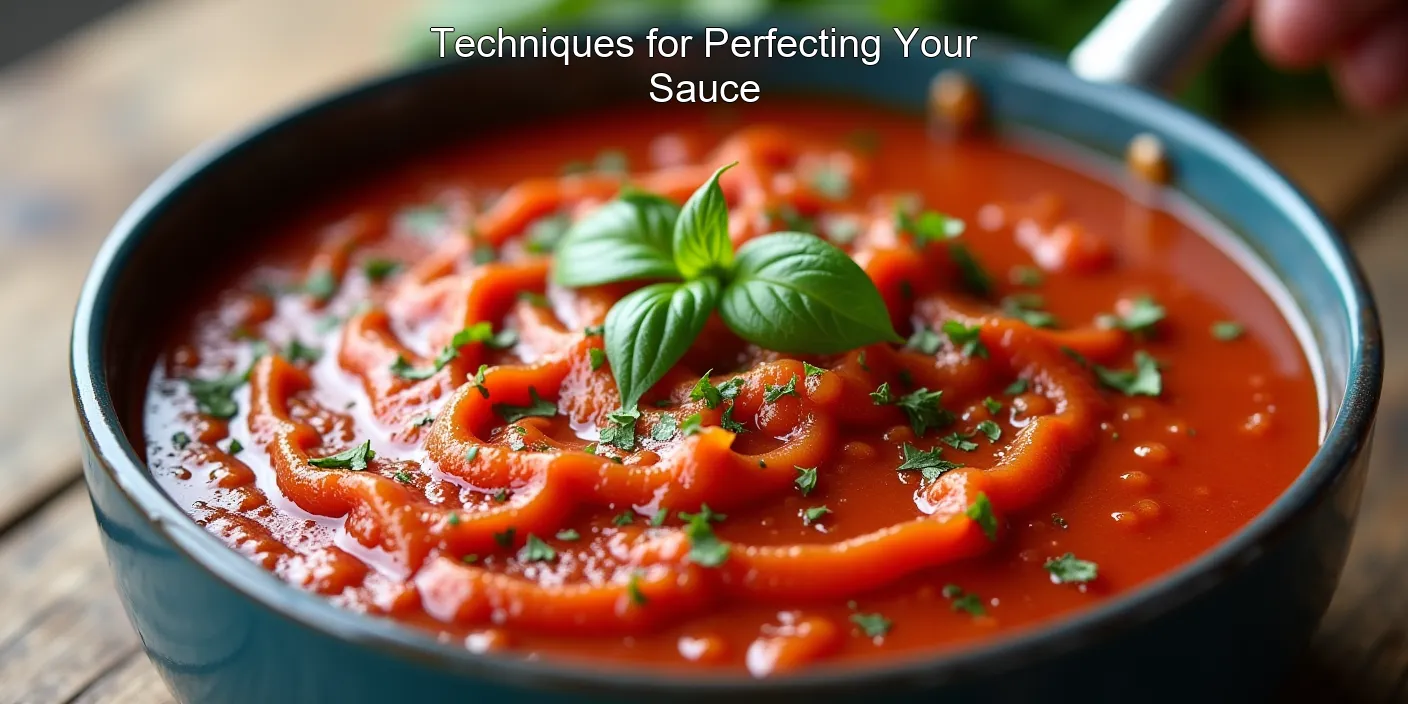
| Technique | Benefit |
|---|---|
| Slow Simmering | Develops rich flavors |
| Proper Seasoning | Enhances overall taste |
| Blending | Creates smooth texture |
Mastering these techniques will elevate your pasta sauce:
“Mastering Pasta Sauce: A Journey from Ingredient Selection to Flavor Perfection”
- Sauté garlic in olive oil until fragrant
- Add tomatoes and simmer on low heat
- Season gradually and taste often
- Use an immersion blender for smooth sauce
- Finish with fresh herbs and a drizzle of olive oil
“A great pasta sauce is all about layering flavors and allowing them time to meld together.” – Chef Anne Burrell
FAQ: Sauce-Making Techniques
Q: Should I add sugar to my pasta sauce?
A: A pinch of sugar can balance acidity, but it’s not always necessary.
Q: How can I make my sauce less acidic?
A: Add a small amount of baking soda or grated carrot to neutralize acidity.
Q: Can I make pasta sauce in advance?
A: Yes, pasta sauce often tastes better the next day as flavors continue to develop.
For quick and easy pasta sauce recipes, visit our Quick & Easy Recipes page.
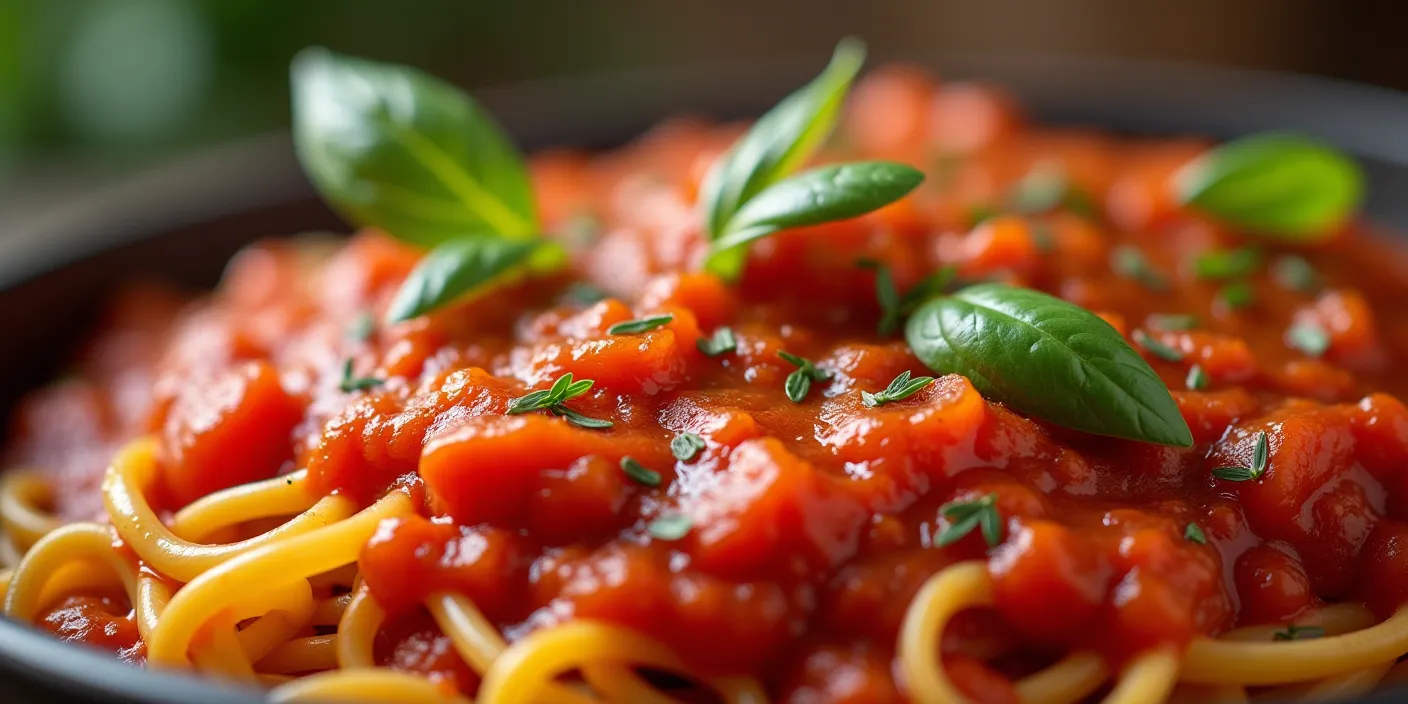
Creating the perfect pasta sauce is a journey of flavor and technique. By following these chef’s tips, you’ll be well on your way to mastering the art of sauce-making. Remember, practice makes perfect, so don’t be afraid to experiment and find your own signature style. For more culinary insights, explore our Chef’s Secrets section, and discover how to make your pasta dishes not just delicious, but also part of a Healthy Eating lifestyle.

